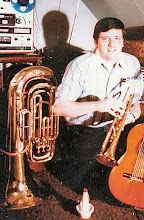

1980 - Ranwood Records 8149-2
CD Listing
1. China Boy
2. Sweethearts On Parade
3. Blue Moods
4. Should I
5. Pete's Tail-Fly
6. San Antonio Rose
7. Barnyard Blues
8. When My Sugar Walks Down The Street
9. 's Wonderful
10. Tea 'n Trumpets
11. Thou Swell
12. Strike Up The Band
Liner Notes:
It was in the Fall of 1956 that three New Orleans musicians journeyed to the West Coast for the annual Gene Norman-Frank Bull Jazz Festival. They were veteran trumpet-man Al Hirt; a fourteen-year-old phenomenon on trumpet, Warren Luning, Jr.; and another veteran from the New Orleans jazz scene, clarinetist Pete Fountain. Among those in the audience that proceeded to flip over the playing of the New Orleans visitors was young Lawrence Welk, Jr. Forthwith he goes to the old man and says, "Dad, this you've gotta hear!" (Or words of similar import.) So Larry, Sr. put down his accordion, turned off the bubble-machine, and made the trip to the auditorium where the jazz bash was being held; and that night an idea was born. To wit: why not build a dixieland contingent from the Welk Orchestra around Pete Fountain, and feature him regularly, both at the dance sessions and on the weekly television broadcasts?
Thus it was that Pete Fountain left Al Hirt's band a few months after their return to New Orleans to accept an offer from Lawrence Welk that was (in Pete's words) "too good to turn down."
Since joining the Lawrence Welk Orchestra as a featured soloist, Pete has taken advantage of the opportunity to study on the west coast - an opportunity which the mature Pete Fountain realized was a valuable one in keeping with his desire to grow musically. He is almost twenty-eight years old.
Although it is essentially the Welk Orchestra backing Pete in this album, the arrangements are not of the "Champagne Music" style. Neither is it a jazz album. Rather it is designed for dancing, with an easily identifiable beat, and tempos well-suited for dancing.
Two years later he returned to jazz and New Orleans. As he puts it, "champagne and bourbon just don't mix" - but in two years he had become one of the most familiar names in American music, so the time had been well spent, well spent indeed.


No comments:
Post a Comment